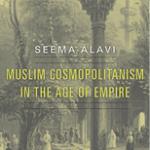Muslim Cosmopolitanism in the Age of Empire

Muslim Cosmopolitanism in the Age of Empire
Seema Alavi
Harvard University Press
ISBN 9780674735330
By Hasan Suroor
What happens offstage or off the field is often more interesting than what you see on stage or on that 22-yard cricket pitch. Similarly, in history, events not reported or deliberately suppressed sometimes tell us more about an era than what’s taught in classrooms. India’s own history is full of events and personalities that have been allowed to fall off the pages because they didn’t fit in the fashionable narrative of the day.
Seema Alavi, noted cultural historian and professor of history at Delhi University, retrieves one such forgotten chapter in her new book, Muslim Cosmopolitanism in the Age of Empire to fill an important gap in the popular accounts of Muslim nationalism in colonial India. More crucially she seeks to challenge the notion of a supposedly inherent conflict between nationalism and pan-Islamism.
Alavi questions the idea that all pan-Islamic projects are necessarily pro-Caliphate and anti-Western by telling the hitherto untold story of five nineteenth-century Sufi Muslim nationalists — Sayyid Fadl, Rahmatullah Kairanwi, Haji Imdadullah Makki, Nawab Siddiq Hasan Khan, and Maulana Jafer Thanesri — who fled India in the wake of the 1857 revolt to escape prosecution for their role in the rebellion. It is an elaborate and fascinating tale of how they used imperial networks — ports, travel routes and communications infrastructure — to build pan-Islamic connections. They sailed across the Indian Ocean to the heartland of the Islamic world (Mecca, Cairo, Istanbul) becoming active participants in the reformist intellectual networks creating a new “Muslim cosmopolitanism at the cusp of the British and Ottoman Empires”.
Though rooted in Islamic scriptures, this new “cosmopolis” was also reformist and advocated contemporary ideas of science, reason and rationality belying the stereotype of a fundamentalist Islam in permanent clash with modernity and western sensibilities.
“This was a cosmopolitanism of the age of empires that had its own claim to a universalist ethics but based on Islamic scripture...and embedded in nineteenth century imperial politics and economic frames of reference,” Alavi writes, rejecting the theory of an “unending clash between nationalism and pan-Islamism in South Asia.”
Though her story goes back 200 years and takes place in a very different historical context, there is a surprisingly contemporary feel to it. Muslim nationalism is still routinely questioned, typically whether they are “Muslim first or Indian first”. Then there is the wider global debate on nationalism versus pan-Islamism fuelled by waves of Muslims from around the world flocking to Syria to fight jihad in the name of Islam; and prop up the so-called Islamic State (IS)’s self-styled Caliphate.
But what is pan-Islamism?
There is an argument that pan-Islamism is a colonial British construct which was used to create a phobia about Islam. In her book, Self and Sovereignty: Individual and Community in South Asian Islam Since 1850, Ayesha Jalal prefers the term ‘Islamic universalism’ which, she argues, Muslims balanced with Indian nationalism. Alavi avoids glib labels and, instead, focuses on a bigger theme: the so-called ‘clash-of-cultures’ theory. In fact, a major contribution of her book is to show — using biographies of her five extraordinary protagonists — that pan-Islam and the European imperial networks were not antagonistic. Pan-Islam was actually “embedded” in Western imperial networks.However, let us leave that for to academics to ponder. What is more relevant for ordinary readers, in the context of an increasingly toxic polemic over Islam and questions about Muslim allegiances, is the perspective Alavi brings to the issue without resorting to polemic or conspiracy theories herself. She draws upon cold historical evidence and real-life stories to argue her case. Moving beyond “the binaries of nationalism and imperialism, the Muslim umma and the European empire, Islam and Christianity, or the East and the West,” she explores the cultural world of Indian Muslims — and the factors that shaped it.
In a passage that will resonate with many Muslims of my generation, Alavi writes about the multicultural influences (exposure to Arabic, Persian and Urdu at home; and English in school) that shaped her own worldview.She felt no contradiction as she moved “from one culture to another, from the shape of one writing system to another, in the course of a single day.”
“I registered the differences. But they were collectively an integral part of my little world,” she writes. Her curiosity to know what life must have been like for Indian Muslims in an earlier time led her to discover a whole new world which bore no resemblance to popular notions of Muslim insularity and Islam being ‘at war’ with the West. The fact is that most Muslims still inhabit a remarkably diverse cultural universe which is both Indian and Islamic at the same time with no conflict between the two. At a time when Samuel Huntington's contentious theory of a ‘clash of civilisations’ has gained traction with the rise of Islamist extremism on the one hand and belligerent western rhetoric on the other, Alavi seeks to restore some sanity to the debate. And for that reason alone, the book deserves to be widely read, though at 400 pages, the uninitiated may often struggle with it.
